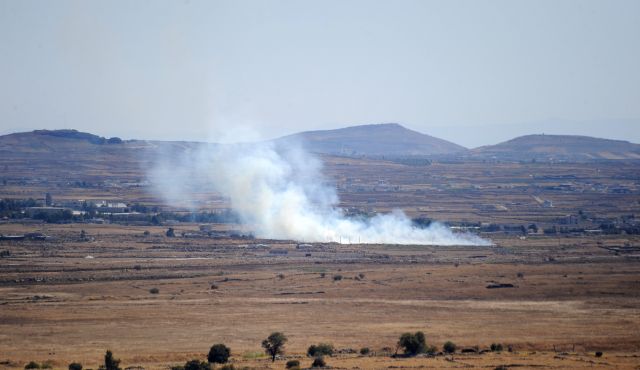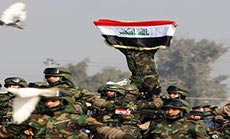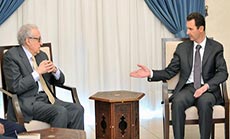“Israel” Fears Golan Heights Turning into Another Gaza Strip

Local Editor
Haaretz "Israeli" daily expressed concern of the IDF, which views that the crisis in Syria forced the "Israeli" army to enter into the Golan Heights, forming a security barrier via local Syrian forces, which work on preventing any fire or missile launching towards the Palestinian territories.
 "The main danger is brewing in Syria, where the 40 years of quiet that began in the wake of the Yom Kippur War have come to an end. Bashar Assad is still in his palace, but the post-Assad era has already started. The army has deteriorated to the status of the leading militia among a whole array of forces fighting over the future of Syria. No one knows if it will survive as a single country or disintegrate into tribal enclaves. No one knows how long the interim period and internal struggle will last," it read.
"The main danger is brewing in Syria, where the 40 years of quiet that began in the wake of the Yom Kippur War have come to an end. Bashar Assad is still in his palace, but the post-Assad era has already started. The army has deteriorated to the status of the leading militia among a whole array of forces fighting over the future of Syria. No one knows if it will survive as a single country or disintegrate into tribal enclaves. No one knows how long the interim period and internal struggle will last," it read.
According to the paper, "The worrisome scenario in the north is that after Assad is gone "Israel" will be attacked, and the Syrian Golan will turn into a new version of the Gaza Strip, with southern Lebanon serving as a base for launching rockets and missiles. This is what is concerning the IDF's top brass. Assad's control of the Golan is disintegrating as his forces are being drawn into the decisive battles around Damascus and the fight for the city's international airport. The shooting incidents from Syria into "Israel" over the past few weeks are just the opening scene in this threatening scenario."
The paper continues "What can "Israel" do? First, the country must internalize the fact that the separation of forces line on the Golan is no longer the quiet border we have known for the past four decades. This understanding has yet to trickle down into the public's consciousness. Last year the military preparedness was strengthened along the border, reservists were replaced with regular troops, observation devices and barriers were upgraded with the help of the lessons learned from building the fences along the borders with Lebanon, Egypt and the West Bank. When the youngsters from the ultra-Orthodox cities of Bnei Brak, Modi'in Ilit and Elad are drafted in the spirit of "sharing the burden," they will be designated for ongoing security operations along the borders."
On the Zionist entity's alliance reinforcement, the article further said "The second level is political and diplomatic. "Israel" has reinforced its alliance with Jordan, whose own border with the Syrian Golan is much longer - and the flood of refugees from the north is worrying Amman's leaders. King Abdullah, who has harshly attacked Netanyahu in the past, now describes him as someone who is contributing to stability. The meetings between the king and Netanyahu are still being held secretly, which the Jordanians justify because of the frozen negotiations between "Israel" and the Palestinians."
According to the article, "The more daring step was making contact with the Syrian rebels in the hope of guaranteeing there will be someone to talk to in Syria after the fall of Assad, and to reduce the risk of a military entanglement. "Israeli" officials deny the claims published in the Arab media that "Israel" has provided the rebels with weapons."
But all these actions are not enough, said the article. ""Israel" may find itself facing the same dilemma it has faced along the Gaza and Lebanese borders: How to achieve quiet and deterrence without invading and conquering territory across the border, and without allowing the situation to deteriorate into a broader conflict. The IDF has little desire to establish a "security zone" on the Syrian side of the Golan. The army prefers to find a local force that will impose quiet on the area and prevent the launching of rockets and missiles on "Israeli" territory. We can assume that this matter is at the heart of the discussion in the "Israel"-Jordan-U.S. triangle. It is clear that it will take a central place in the discussions of Netanyahu's new cabinet.
Source: Haaretz, edited by moqawama.org
Comments

France’s Hollande in Qatar for Warplane Deal
9 years ago
Iraq Police Dismantles Al-Qaeda Protest Site
10 years ago

